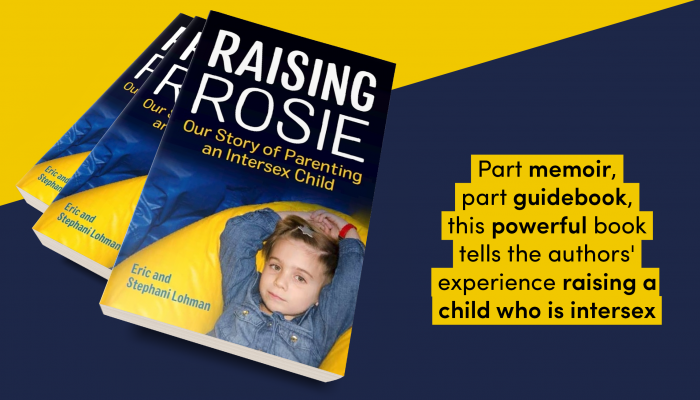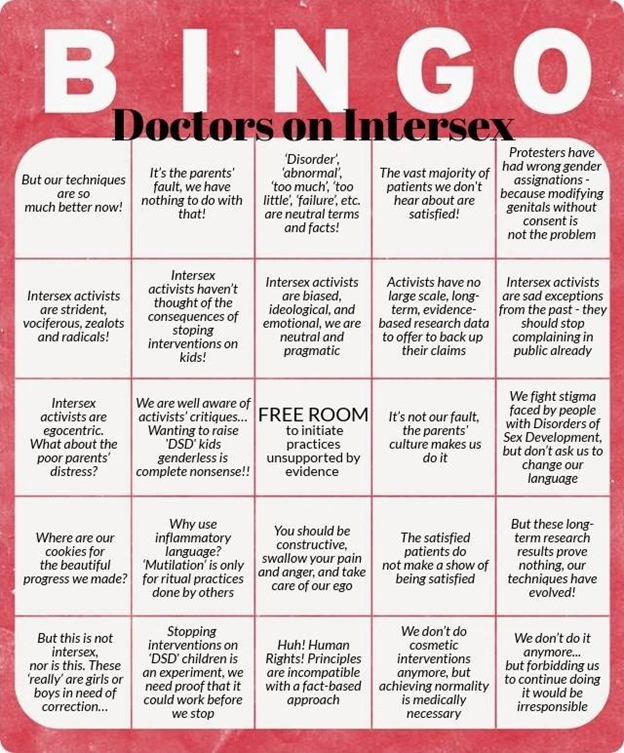 Eric and Stephani Lohman are the authors of JKP’s first book on intersex—Raising Rosie. Here Stephani gives a brief introduction to some of the hurdles they faced as parents of an intersex child and misperceptions of intersex people in today’s society. Eric Lohman, PhD. is lecturer and researcher at the University of Wisconsin-Milwaukee, focusing on gender, race, and class in the mass media. Stephani Lohman, BS, BScN. works as an infection prevention nurse, and has degrees in chemistry, biology, and nursing. She’s worked in health care and sciences for 10 years.
Eric and Stephani Lohman are the authors of JKP’s first book on intersex—Raising Rosie. Here Stephani gives a brief introduction to some of the hurdles they faced as parents of an intersex child and misperceptions of intersex people in today’s society. Eric Lohman, PhD. is lecturer and researcher at the University of Wisconsin-Milwaukee, focusing on gender, race, and class in the mass media. Stephani Lohman, BS, BScN. works as an infection prevention nurse, and has degrees in chemistry, biology, and nursing. She’s worked in health care and sciences for 10 years.
Recently, my sister, Jen, started a new job. She put a wedding photo on her desk, and while in a meeting someone commented on the photo, asking, “Did you just get married?” Jen replied yes. Now, here is where the situation diverges from my experience as a straight woman. Her coworker then said, “Is that a man or a woman?” The photo showed my sister in a lovely white gown and her new wife in a stylish grey suit. I also proudly display a photo of me and my partner on my desk, but no one has ever asked me a single question about it. Uncomfortably, my sister moved the conversation to a new topic, as she says she often does.
The perceived norm is straight. And while there was probably no harm meant by the observation of a “curious” coworker, it betrays a bigger issue. The perpetuation of heterosexism in our community creates big ripples. When fear of the other continues, we all feel the effects. Consider our healthcare systems. They are set up to serve the binary from the day you are conceived! Boy or girl, pink or blue? All seems fine and good until there is a problem in the binary matrix. My own experience is a testament to the view of intersex people as abnormal. My child, Rosie, was born intersex as a result of a genetic condition. My partner and I were hounded for months to allow surgeons to “correct” Rosie’s genitals. Initially, we were fine to just bow out of the surgery and quietly move on with our lives. But it quickly became clear that my family was an anomaly, a glitch that threatened the long held, heterosexist beliefs of the medical community.
What else was there to do but start arguing back? I heard such weak excuses for why genital mutilation of infants, a practice that is condemned by countless human rights advocacy groups, continues in what are fancied “developed nations.” Let’s look at a list of reasons that doctors and even some parents of intersex children offer for their continued support of genital surgery of intersex infants. The list, which is not exhaustive, just what people in the intersex community have shared with me through various social media platforms. One Intersex activist, Janik Bastien, created a bingo card because these hackneyed excuses are well known throughout the intersex community.
- Surgical techniques are so much better today than they were in the past.
- Long term research results that demonstrate poor surgical outcomes prove nothing because our techniques have evolved.
- The vast majority of patients we DO NOT hear about are satisfied!
- Children with certain disorders of sexual development (DSD) are NOT intersex people. These are really XX girls in need of correction so they match their chromosomal sex.
- Stopping interventions on “DSD” children is an experiment and we need proof that it could work before we stop.
- These are not cosmetic surgeries; they are surgeries to make people normal.
- Intersex activists are biased, ideological, and emotional. Doctors are neutral and pragmatic.
- Performing surgery as an infant spares the child from ever knowing they were “different.”
- Early surgery results in better healing.
- Parents should have full authority and autonomy over their children’s’ medical care, and they know the risks and benefits.
- There are some cultures that will not accept or tolerate genital differences, so early surgery spares the infants from harm.
- Performing surgery as an infant promotes parent bonding and prevents stigma.
- There is no data to support stopping the practice of infant genital cosmetic surgery and we don’t know what would happen if we stop.
If I had the space, I could refute all of these points individually, but it works just as well to call them what they are: institutional homophobia. In my experience writing a book on raising an intersex child, a book that stems from my personal experiences discussing surgery with parents and doctors, and reading medical journals, one thing became abundantly clear, no matter what evidence or argument you bring up to get doctors and their supporters to cease performing unnecessary genital surgeries on intersex kids, they will always try to find a new justification rather than admit they are wrong. They constantly move the goal posts right when you are about to make a point, which suggests that this is not really about the litany of issues that they claim; not really about a lack of evidence or surgical outcomes, but is about their own mistaken beliefs and ideals about how a body is supposed to look. In the book that my partner, Eric, and I co-authored, we talk a lot about this topic and our struggles to work within a paradigm that is unrelentingly binary.
It is not always clear that our communities are built on a foundation of heterosexism, but when you hear these excuses that are disguised as scientific rationale, it becomes clear that despite the gains that the LGBTQI community has made during their struggles, there is still so much left to do. We have to challenge the well-meaning people who demonstrate homophobic, transphobic, biphobic, or queerphobic behavior, or we all become unwitting participants in a system that continues to push LGBTQI people to the margins of our communities and prevents them from getting informed and inclusive health care.

To learn more about Raising Rosie, please visit: intl.jkp.com